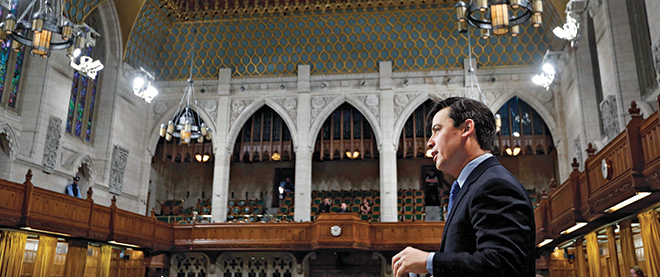Explainer: The story of the Reform Act so far
The Reform Act comes to the House for debate
Chris Wattie/Reuters
Share

The Reform Act, the much-discussed private member’s bill from Michael Chong, designed to fix some of what ails our parliamentary system, comes before the House of Commons this evening for its first hour of debate. We’ve been following the bill since word of its impending arrival leaked last November. Picking up with this earlier explainer, here is the story of the Reform Act so far.
Who is Michael Chong?
Mr. Chong is the Conservative MP for Wellington-Halton Hills.
Don’t I remember him from somewhere?
Probably. For awhile after the Conservatives formed government in 2006, Mr. Chong was the Intergovernmental Affairs Minister, but he quit cabinet in November 2006 because he could not support the Prime Minister’s motion that the Québécois formed a nation within a united Canada. He has been a backbencher ever since. In May 2010, he proposed a series of reforms to Question Period, which generated a great deal of discussion, but which have so far failed to be implemented.
What’s he on about now?
Last December he tabled Bill C-559, which came to be known as the Reform Act, 2013. The bill was basically designed to do three things. First, it proposed to give control of candidate selection to local riding associations—eliminating the requirement that a candidate seeking to run for a party must have the endorsement of the party leader. Second, it would formally bestow upon parliamentary caucuses the power to choose their caucus chairs and expel and re-admit members. Third, it would provide parliamentary caucuses with a formal mechanism to dump their party leaders.
Mr. Chong’s basic thesis is that the balance of power between party leaders and MPs is currently imbalanced in favour of the party leaders. He and I talked about this when his bill was first tabled. From that imbalance, in theory, follows a system in which MPs and the House of Commons are not sufficiently empowered. Depending on how far you want to take that, you might blame this imbalance for much of what is lamented about our current situation—from Parliament’s ability to hold the government to account to the stultifying nature of political debate.
Sounds like somebody’s challenging the basic power structures of our democratic system. I imagine this was cause for some debate?
Indeed. You can read some of that debate here, here, here, here, here, here and here. (That’s a lot of links, but the debate is truly quite interesting to follow.) Specific concerns were raised about how the Reform Act would impact the management and coherence of local nomination races—see here, here, here and here—while others fretted that a party caucus would be able to effectively overturn the leadership selection of a party’s membership. It’s all been, if nothing else, an opportunity to try to sort out how our system works, how it should work and how interconnected its various pieces are.
Did Mr. Chong manage to pick up much support for his bill?
By this spring, C-559 had been seconded by 19 MPs—Conservatives James Rajotte, Stella Ambler, Rob Clarke, Ben Lobb, Leon Benoit, Dick Harris, Mike Allen, Peter Kent, Gord Brown, Larry Miller, Kyle Seeback, Russ Hiebert, Gerry Breitkreuz, Brian Storseth and Patrick Brown; New Democrats Kennedy Stewart and Peter Stoffer; and Green MPs Elizabeth May and Bruce Hyer.
Independents Dean Del Mastro and Brent Rathgeber and NDP critic Craig Scott also added their support.
Was Mr. Chong at all persuaded by some of the concerns raised by the bill?
Apparently he was. In March, he signalled that he was ready to make certain changes. The power to confirm a local candidate would be given not entirely to the local riding association, but to a provincial nomination officer elected by the local riding associations in a given province. The thresholds for launching a leadership review and dumping a leader would be increased.
And on that note, Mr. Chong tabled a new bill in April. C-586—The Reform Act, 2014—is thus now up for debate.
What should we watch for tonight?
Depending on who speaks, we might get a better sense of where the parties officially stand—even if, as with most private members’ bills, MPs are given a free vote on the Reform Act, it will still be interesting to see what stances, if any, the party leaderships take.
We might also see whether any new or lingering concerns exist despite the changes made.
Then what?
Private members’ bills receive two hours of debate in the House. We will likely have to wait until the fall for the Reform Act’s second hour, after which it will be put to the House for a vote. If it passes then at second reading, it will be sent to the Procedure and House Affairs committee for study. So there are a few steps yet between now and final passage. We don’t yet entirely know how widespread support is and how strong that support might be. Second-reading debate and committee study will presumably clarify both those things. One way or another, this bill is likely to receive a final vote before the next election.